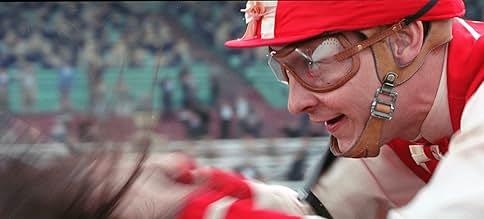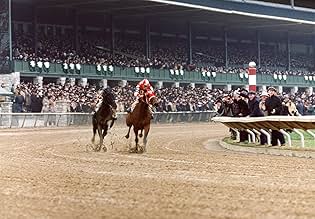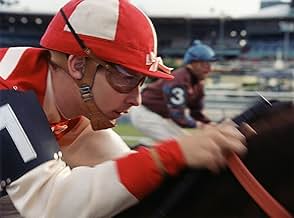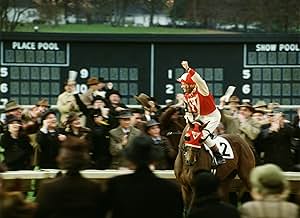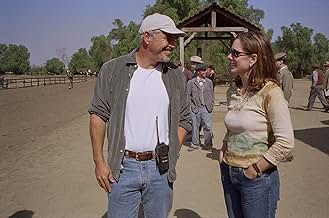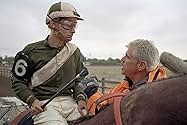PUNTUACIÓN EN IMDb
7,3/10
79 mil
TU PUNTUACIÓN
La historia real del pequeño caballo de carreras de la era de la Depresión cuyas victorias no solo animaron a su equipo, sino a toda la nación.La historia real del pequeño caballo de carreras de la era de la Depresión cuyas victorias no solo animaron a su equipo, sino a toda la nación.La historia real del pequeño caballo de carreras de la era de la Depresión cuyas victorias no solo animaron a su equipo, sino a toda la nación.
- Dirección
- Guión
- Reparto principal
- Nominado para 7 premios Óscar
- 6 premios y 44 nominaciones en total
Carl M. Craig
- Sam
- (as Kingston DuCoeur)
Reseñas destacadas
Based on the best-selling novel Seabiscuit: An American Legend by Laura Hillenbrand, Gary Ross directed 'Seabiscuit' is a film with a Spirit! It's a courageous true-story, that also makes a moving film. The Direction, The Cinematography, The Performances, all pitch in nicely.
'Seabiscuit' tells the story of Three men, who, come together, respectively, as the principal jockey, owner, and trainer of the championship horse Seabiscuit, rising from troubled times to achieve fame and success through their association with the horse.
Gary Ross's Adapted Screenplay, manages to make a worthy true-story into a worthy film. The characters, The Horse itself, are wonderfully explained. However, the film definitely could've been trimmed, by at least 10-15 minutes. Ross's direction deserves brownie points, as well. John Schwartzman's Cinematography is gorgeous. Editing is good. Art-Design seems perfect.
Performance-Wise: Tobey Maguire is dependable. Jeff Bridges is natural & restrained throughout, while Chris Cooper is simply fantastic. Elizabeth Banks is passable. Gary Stevens & William H. Macy are fair.
On the whole, 'Seabiscuit' comes up a winner in it's intentions. Go, get moved!
'Seabiscuit' tells the story of Three men, who, come together, respectively, as the principal jockey, owner, and trainer of the championship horse Seabiscuit, rising from troubled times to achieve fame and success through their association with the horse.
Gary Ross's Adapted Screenplay, manages to make a worthy true-story into a worthy film. The characters, The Horse itself, are wonderfully explained. However, the film definitely could've been trimmed, by at least 10-15 minutes. Ross's direction deserves brownie points, as well. John Schwartzman's Cinematography is gorgeous. Editing is good. Art-Design seems perfect.
Performance-Wise: Tobey Maguire is dependable. Jeff Bridges is natural & restrained throughout, while Chris Cooper is simply fantastic. Elizabeth Banks is passable. Gary Stevens & William H. Macy are fair.
On the whole, 'Seabiscuit' comes up a winner in it's intentions. Go, get moved!
"Sea Biscuit" is a story about a long shot horse and a man who discover each other on the road to equestrian glory. An extremely rewarding journey though the lives of man and beast. Every aspect of human emotion, bonding and courage is explored with an "equine" tinge. Set in a time when horse racing is more passion than business, Seabiscuit glorifies the positive appeal of horse racing. Every derby event is an emotional doorway which lifts your spirits. Be it the Santa Anita or the Pimilco, you are just just hanging on the edge of your seat praying, vying and hoping for a Seabiscuit win. Such is the emotional grasp and visual brilliance of Gary Ross's direction and Scwartzman's cinematography. Being a thoroughbred race horse by birth, Seabiscuit treads the race track under the watchful eyes of trainer Tom Smith (played by Chris Cooper) and jockey Red Poddard (played by Tobey Mcguire). What follows is a sequence of predictable vicissitudes. Why! This movie wasn't advertised in the mystery genre either!
A frail looking (really) Tobey manages to deeply bond with the horse at least on screen, kudos indeed. Nobody else could have possibly fit into his role as well as he did, physically too. Chris Cooper is the silent marvel. There is a completely subtle tinge to his acting which lays low, yet beautifully exuberates class. Seabiscuit is simply one of those "silent' movies which just hurtles you beyond imaginable frontiers. Sit back and relax and let the long shot consume you.
A frail looking (really) Tobey manages to deeply bond with the horse at least on screen, kudos indeed. Nobody else could have possibly fit into his role as well as he did, physically too. Chris Cooper is the silent marvel. There is a completely subtle tinge to his acting which lays low, yet beautifully exuberates class. Seabiscuit is simply one of those "silent' movies which just hurtles you beyond imaginable frontiers. Sit back and relax and let the long shot consume you.
Roger Ebert says he has a theory that `people more readily cry at movies not because of sadness, but because of goodness and courage.'
This is certainly a reason why Gary Ross's Seabiscuit tugs so effectively at the heartstrings. But the main one is the way the movie shows the triumph of the underdog spread fourfold among three men and a horse. And again the timing is right in the American release. Just as Danny Boyle's 28 Days Later was delightful because it was a low budget movie that could compete with a lot of loud and dubious blockbusters, Seabiscuit earns our gratitude by being a blockbuster without explosions or exhibitionism, an epic of restraint, modesty and -- yes -- `goodness and courage.' The loudest sound you hear is the starting bell for the races. There are those of us, mainstream folk, who've been starving for such fare. I saw people in the audience in the early matinee who plainly were alive in 1929 and 1938, and they wept and applauded throughout with awe and gratitude. We shall see how the younger generations respond.
An enthusiastic response is justified. There is nothing in Seabiscuit that's very original; it awakens involuntary flashbacks to many traditional Rocky-esque sports biopics as one watches. But Gray and his chief collaborators, the talented author Lauren Hillenbrand and the splendid cast headed by Jeff Bridges, Chris Cooper, and co-producer Tobey McGuire, have nonetheless provided us with a quite wonderful movie, as much for its surefire writing and brilliant editing as for any of the acting.
Everyone must agree that the three men behind the most famous horse of his time are played by three of the best actors Hollywood now has to offer. Critics are in accord in saying Cooper's performance is the subtlest and the most real: he models the principle that Less is More. Tobey McGuire isn't given quite enough to do; his greatest accomplishment may be his lean look; he's barely recognizable, and as a former redhead myself I don't think the dye job is as bad as some have claimed. Bridges is, in his way, magnificent, but glossily iconic and therefore somewhat opaque. His resemblance to Franklin D. Roosevelt is pushed a bit too hard, as is the whole uplifting populist message - the `we didn't fix the horse. He fixed us - and we fixed each other,' and `sometimes all somebody needs is a second chance,' stuff. (It's pretty corny. But within the context of this beautifully made movie that believes in itself, we buy it.)
It's important, anyway - if young people do come to see Seabiscuit - for them to get the simplified, but nonetheless just portrait of the times provided with authentic stills and footage, and the voiceover narration by iconic historian David ("The Civil War") McCullough. The travelogue of the Depression and Prohibition years includes a quiet but heartfelt plug for FDR and that, too, is moving, especially in today's post-Yuppie mood of numbingly exploitive jingoism.
Indeed each of the three actors gives a powerfully understated performance - they're like thoroughbreds who're never given their head - whose litotes (a word schoolboys learned back then) enhances the movie's epic quality by never letting us forget that their triumphs were snatched from deprivation and adversity.
The long time devoted to the three men's backgrounds early in the movie isn't ill spent. It establishes the leisurely pace that is the essence of epic. But these back-stories aren't as necessary as the filmmakers may have thought. And despite the slow movement, there isn't deep detail. There's barely one scene to establish Red Pollard's (McGuire's) literate, close-knit family before he's cast (heartbreakingly) out of it. Charles Howard's (Bridge's) loss of his son is too telegraphic, though it's a fine touch to show him wailing with the boy's body but with his voice barely audible: it's one more example of the movie's sense of the period and of its restraint.
Right from the first the horse races are astonishing in the camera's closeness and vividness, the way we feel the danger and physicality of the jockeys' brutal competition with one another. Since we know Pollard is a failed prizefighter and general scrapper, we take in stride that fact that he's physically fighting with other jockeys during the early races. This is a movie about horse racing and the races had better be terrific, and they are. It's when we see the power of those sequences that we realize Seabiscuit has the makings of a popular classic.
Jeff Bridges' performance in particular seems etched in stone. There are touches of Jimmy Stewart, Joseph Cotton, even Orson Welles in his role and his looks. The chameleon Bridges comes carrying traces of Coppola's Tucker, but he has entered into the period and the tradition with utter conviction. Cooper's austere minimalism, because it is the essential spirit of the movie, its understatement (litotes), is the central performance. He is a man who communicates better with horses than with men. McGuire's performance is the noisiest, but he too reflects the social restraints of the period, and his wings are clipped before the final triumph can take place. This was a time when people had superiors and recognized it by calling them Sir and Mister. Everyone male wore a suit and tie, even jockeys off duty.
Seabiscuit's ability to tug at the heartstrings first appears when Red Pollard is let go by his destitute father so he can be a jockey. The moment is deeply sad because what seems an act of heroic renunciation by a loving parent is in fact abandonment, and it feeds the young man's rage thenceforth. And it's more complex than that because it grows out of the enormous pressures of the Depression, a time when millions in America wandered westward deprived of everything but their cars and a few possessions.
Not only Bridges' performance but whole sequences of Seabiscuit seem etched in stone and contain examples of textbook-perfect editing that possesses sweep and complexity and advances the story while keeping our focus on the prevailing mood.
This is, of course, the classic American story of triumph out of defeat and resolution out of conflict. As is a little too clearly pointed out, all three men, Charles Howard, Tom Smith, and Red Pollard, have had great devastation and loss in their lives (echoed by the whole country's economic devastation, failure, and loss of nerve; and it's implied -- with some failure of restraint -- that Seabiscuit's underdog triumphs were as needed as the New Deal). Their horse was rescued by Smith (Chris Cooper) when it was going to be shot because it seemed unruly and untrainable. Out of all this failure and tragedy the men forge their victories: Seabiscuit, the horse that lacked breeding, was untrainable, and was `too small'; Pollard, abandoned by his parents, beaten in many prize fights, secretly blind in one eye and `too big' to be a top jockey; Smith, a gifted horse tamer and trainer reduced to riding the rails and hoboing; Bridges, the self-made millionaire devastated by the destruction of all his hopes in a ruined economy and the sudden death of his young only son. They bond together to make Seabiscuit into one of the greatest racehorses in history. Who wouldn't be moved by this? Only the conventional fat man who's War Admiral's snobbish Maryland owner. It's all about heart, and Seabiscuit's got it.
William H. Macy's caricatured portrait of an alcoholic radio announcer is a highlight, in the sense of a bright spot on a painting. It's a shrill and brittle performace that we tolerate because of the moments of relief Macy's little comic vignettes provide. Subtlety is sacrificed to provide an effect, and to brush in a bit of humor amid all the earnestness. One only wishes there were more of a progression; that the character didn't sip from the same bottle in every scene but got drunker, or soberer, as things went along.
We have to allow for the exigencies of filmmaking that required ten horses to be used for Seabiscuit, leading to the irony that this unique horse is a composite.
If you accept its conventionality, Seabiscuit is not just a good movie but a great one.
This is certainly a reason why Gary Ross's Seabiscuit tugs so effectively at the heartstrings. But the main one is the way the movie shows the triumph of the underdog spread fourfold among three men and a horse. And again the timing is right in the American release. Just as Danny Boyle's 28 Days Later was delightful because it was a low budget movie that could compete with a lot of loud and dubious blockbusters, Seabiscuit earns our gratitude by being a blockbuster without explosions or exhibitionism, an epic of restraint, modesty and -- yes -- `goodness and courage.' The loudest sound you hear is the starting bell for the races. There are those of us, mainstream folk, who've been starving for such fare. I saw people in the audience in the early matinee who plainly were alive in 1929 and 1938, and they wept and applauded throughout with awe and gratitude. We shall see how the younger generations respond.
An enthusiastic response is justified. There is nothing in Seabiscuit that's very original; it awakens involuntary flashbacks to many traditional Rocky-esque sports biopics as one watches. But Gray and his chief collaborators, the talented author Lauren Hillenbrand and the splendid cast headed by Jeff Bridges, Chris Cooper, and co-producer Tobey McGuire, have nonetheless provided us with a quite wonderful movie, as much for its surefire writing and brilliant editing as for any of the acting.
Everyone must agree that the three men behind the most famous horse of his time are played by three of the best actors Hollywood now has to offer. Critics are in accord in saying Cooper's performance is the subtlest and the most real: he models the principle that Less is More. Tobey McGuire isn't given quite enough to do; his greatest accomplishment may be his lean look; he's barely recognizable, and as a former redhead myself I don't think the dye job is as bad as some have claimed. Bridges is, in his way, magnificent, but glossily iconic and therefore somewhat opaque. His resemblance to Franklin D. Roosevelt is pushed a bit too hard, as is the whole uplifting populist message - the `we didn't fix the horse. He fixed us - and we fixed each other,' and `sometimes all somebody needs is a second chance,' stuff. (It's pretty corny. But within the context of this beautifully made movie that believes in itself, we buy it.)
It's important, anyway - if young people do come to see Seabiscuit - for them to get the simplified, but nonetheless just portrait of the times provided with authentic stills and footage, and the voiceover narration by iconic historian David ("The Civil War") McCullough. The travelogue of the Depression and Prohibition years includes a quiet but heartfelt plug for FDR and that, too, is moving, especially in today's post-Yuppie mood of numbingly exploitive jingoism.
Indeed each of the three actors gives a powerfully understated performance - they're like thoroughbreds who're never given their head - whose litotes (a word schoolboys learned back then) enhances the movie's epic quality by never letting us forget that their triumphs were snatched from deprivation and adversity.
The long time devoted to the three men's backgrounds early in the movie isn't ill spent. It establishes the leisurely pace that is the essence of epic. But these back-stories aren't as necessary as the filmmakers may have thought. And despite the slow movement, there isn't deep detail. There's barely one scene to establish Red Pollard's (McGuire's) literate, close-knit family before he's cast (heartbreakingly) out of it. Charles Howard's (Bridge's) loss of his son is too telegraphic, though it's a fine touch to show him wailing with the boy's body but with his voice barely audible: it's one more example of the movie's sense of the period and of its restraint.
Right from the first the horse races are astonishing in the camera's closeness and vividness, the way we feel the danger and physicality of the jockeys' brutal competition with one another. Since we know Pollard is a failed prizefighter and general scrapper, we take in stride that fact that he's physically fighting with other jockeys during the early races. This is a movie about horse racing and the races had better be terrific, and they are. It's when we see the power of those sequences that we realize Seabiscuit has the makings of a popular classic.
Jeff Bridges' performance in particular seems etched in stone. There are touches of Jimmy Stewart, Joseph Cotton, even Orson Welles in his role and his looks. The chameleon Bridges comes carrying traces of Coppola's Tucker, but he has entered into the period and the tradition with utter conviction. Cooper's austere minimalism, because it is the essential spirit of the movie, its understatement (litotes), is the central performance. He is a man who communicates better with horses than with men. McGuire's performance is the noisiest, but he too reflects the social restraints of the period, and his wings are clipped before the final triumph can take place. This was a time when people had superiors and recognized it by calling them Sir and Mister. Everyone male wore a suit and tie, even jockeys off duty.
Seabiscuit's ability to tug at the heartstrings first appears when Red Pollard is let go by his destitute father so he can be a jockey. The moment is deeply sad because what seems an act of heroic renunciation by a loving parent is in fact abandonment, and it feeds the young man's rage thenceforth. And it's more complex than that because it grows out of the enormous pressures of the Depression, a time when millions in America wandered westward deprived of everything but their cars and a few possessions.
Not only Bridges' performance but whole sequences of Seabiscuit seem etched in stone and contain examples of textbook-perfect editing that possesses sweep and complexity and advances the story while keeping our focus on the prevailing mood.
This is, of course, the classic American story of triumph out of defeat and resolution out of conflict. As is a little too clearly pointed out, all three men, Charles Howard, Tom Smith, and Red Pollard, have had great devastation and loss in their lives (echoed by the whole country's economic devastation, failure, and loss of nerve; and it's implied -- with some failure of restraint -- that Seabiscuit's underdog triumphs were as needed as the New Deal). Their horse was rescued by Smith (Chris Cooper) when it was going to be shot because it seemed unruly and untrainable. Out of all this failure and tragedy the men forge their victories: Seabiscuit, the horse that lacked breeding, was untrainable, and was `too small'; Pollard, abandoned by his parents, beaten in many prize fights, secretly blind in one eye and `too big' to be a top jockey; Smith, a gifted horse tamer and trainer reduced to riding the rails and hoboing; Bridges, the self-made millionaire devastated by the destruction of all his hopes in a ruined economy and the sudden death of his young only son. They bond together to make Seabiscuit into one of the greatest racehorses in history. Who wouldn't be moved by this? Only the conventional fat man who's War Admiral's snobbish Maryland owner. It's all about heart, and Seabiscuit's got it.
William H. Macy's caricatured portrait of an alcoholic radio announcer is a highlight, in the sense of a bright spot on a painting. It's a shrill and brittle performace that we tolerate because of the moments of relief Macy's little comic vignettes provide. Subtlety is sacrificed to provide an effect, and to brush in a bit of humor amid all the earnestness. One only wishes there were more of a progression; that the character didn't sip from the same bottle in every scene but got drunker, or soberer, as things went along.
We have to allow for the exigencies of filmmaking that required ten horses to be used for Seabiscuit, leading to the irony that this unique horse is a composite.
If you accept its conventionality, Seabiscuit is not just a good movie but a great one.
So here it is: a story about a horse that would give spirit to a whole nation, after the depression of the late 20's and early 30's. Make it a story where the horse and it's jockey have to overcome injury to win it's final great race, and you got your tearjerker (and, therefore, Oscar winner) right there.
But, somehow, 'Seabiscuit' is much more than that. What is definitely a help, is it's incredible cast. Tobey McGuire once more shows he's one of the better youngsters around in Hollywood, and old-timers Jeff Bridges and Chris Cooper will do the rest for ya, even though Cooper is not at his best here as Tom Smith, the trainer for the horse. Then there's William H. Macy in a hilarious role as 'Tick Tock McGlaughlin', a radio presenter.
The life-story we follow the most though is that of Charles Howard (Bridges), owner of the horse. As a self-made millionaire selling cars, who lost his son due to a car-accident, he finds a little bit of joy back to life, with his new wife and his new love, the horsing business. His inspirational speeches make 'Seabiscuit' a crowd-pleaser, in particular that of the 'common people', who recognize themselves in the little horse.
As said, the movie is a little bit too much of a happy ending story to really make it into the 'classic' category, but the movie looks great and hasn't got a boring moment in it. Good acting all around therefore make it a very pleasant movie experience. Although the 7 academy award nominations were a little bit much...
7/10.
But, somehow, 'Seabiscuit' is much more than that. What is definitely a help, is it's incredible cast. Tobey McGuire once more shows he's one of the better youngsters around in Hollywood, and old-timers Jeff Bridges and Chris Cooper will do the rest for ya, even though Cooper is not at his best here as Tom Smith, the trainer for the horse. Then there's William H. Macy in a hilarious role as 'Tick Tock McGlaughlin', a radio presenter.
The life-story we follow the most though is that of Charles Howard (Bridges), owner of the horse. As a self-made millionaire selling cars, who lost his son due to a car-accident, he finds a little bit of joy back to life, with his new wife and his new love, the horsing business. His inspirational speeches make 'Seabiscuit' a crowd-pleaser, in particular that of the 'common people', who recognize themselves in the little horse.
As said, the movie is a little bit too much of a happy ending story to really make it into the 'classic' category, but the movie looks great and hasn't got a boring moment in it. Good acting all around therefore make it a very pleasant movie experience. Although the 7 academy award nominations were a little bit much...
7/10.
After the American Depression, the millionaire Charles Howard (Jeff Bridges) gets married again with Marcela (Elizabeth Banks) and decides to invest in a race horse. He gathers the old couch Tom Smith (Chris Cooper), the problematic jockey Red Pollard (Tobey Maguire) and the horse Seabiscuit, all of them losers, and he believes on them, giving a second chance to them. Seabiscuit becomes a winner and legend in a difficult period of the American life. "Seabiscuit" is a beautiful film with positive and wonderful messages. Charles Howard has the best lines, such as: "When the little guy doesn't know that he is little, he is capable of big things"; or, "Sometimes all somebody needs is a second chance". The excellent and underrated actor Chris Cooper has probably his best performance along his career. Although having 141 minutes running time, the viewer does not feel time passing. I particularly liked not only the direction, performances, locations and reconstitution of a period, but mainly the never corny and very positive messages in the excellent lines and screenplay. My vote is eight.
Title (Brazil): "Seabiscuit Alma de Herói" ("Seabiscuit Soul of Hero")
Title (Brazil): "Seabiscuit Alma de Herói" ("Seabiscuit Soul of Hero")
¿Sabías que...?
- CuriosidadesThe movie describes War Admiral as huge, close to 18 hands tall. In real life, War Admiral was about 15 hands tall, the same size as Seabiscuit.
- PifiasWar Admiral is repeatedly referred to as being 18 hands vs. Seabiscuit's 15 hands. The horses were actually the same height, with some sources listing Seabiscuit as the heavier of the two.
- ConexionesEdited into The Making of 'Seabiscuit' (2003)
- Banda sonoraMexico Lucido
Performed by Jose Hernandez and the Mariachi Sol de Mexico (as Mariachi Sol de Mexico de Jose Hernandez)
Courtesy of Serenata Records
Selecciones populares
Inicia sesión para calificar y añadir a tu lista para recibir recomendaciones personalizadas
- How long is Seabiscuit?Con tecnología de Alexa
Detalles
- Fecha de lanzamiento
- País de origen
- Idioma
- Títulos en diferentes países
- Alma de héroe
- Localizaciones del rodaje
- Hemet, California, Estados Unidos(Hemet Stock Farm)
- Empresas productoras
- Ver más compañías en los créditos en IMDbPro
Taquilla
- Presupuesto
- 87.000.000 US$ (estimación)
- Recaudación en Estados Unidos y Canadá
- 120.277.854 US$
- Fin de semana de estreno en EE. UU. y Canadá
- 20.854.735 US$
- 27 jul 2003
- Recaudación en todo el mundo
- 148.336.445 US$
- Duración2 horas 20 minutos
- Color
- Mezcla de sonido
- Relación de aspecto
- 2.39 : 1
Contribuir a esta página
Sugerir un cambio o añadir el contenido que falta

Principal laguna de datos
What is the streaming release date of Seabiscuit, más allá de la leyenda (2003) in India?
Responde

